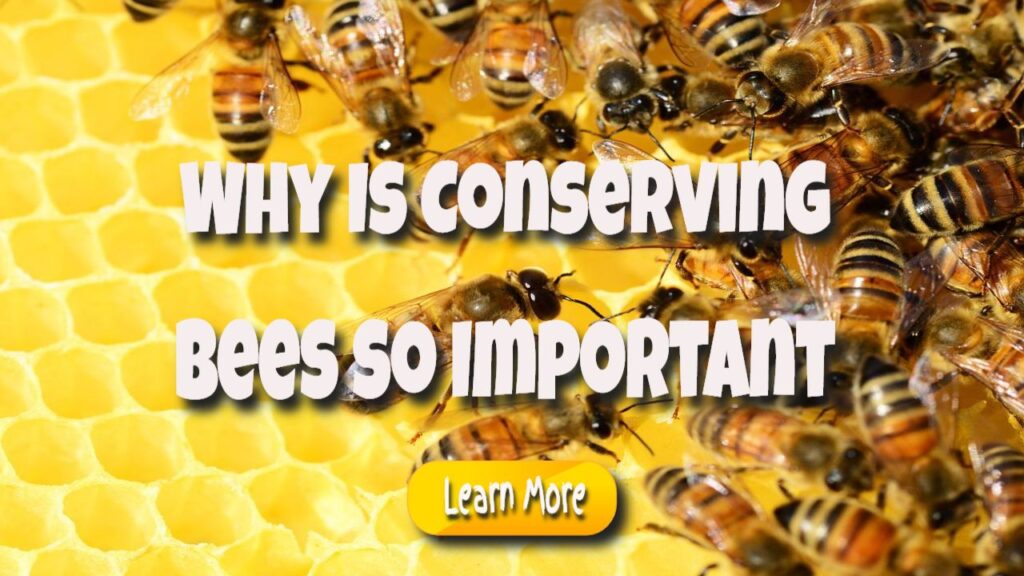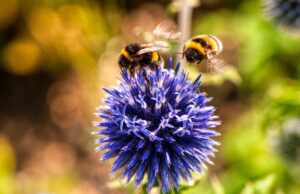Why Is Conserving Bees so Vital for People and the Environment?
Why Is Conserving Bees so Vital for People and the Environment?: Bees are among the most amazing animals on the earth, with silken beauties no larger than a marble pollinating with pollen.
They buzz over your garden or apple orchard, hopping from blossom to bloom and inserting their heads into the petals in search of nectar and pollen.
In turn, bees help flowers by delivering pollen, a process known as pollination. Many plants could not pollinate without the assistance of bees and other pollinators. As a result, both the bee and the bloom profit from the success and reproduction of the other.
Bees pollinate a variety of crops. Butterflies, moths, and other insects pollinate, but bees provide pollination services to farmers globally worth billions of dollars.
Many of the world’s food crops are pollinated by insects and animals, and pollinators are essential for the growth of many different fruits, nuts, and berries.
Bee pollination is essential or beneficial to over 70 crops in the United Kingdom.
Honeybees, wild bees, and bumblebees pollinate crops for farmers. Manual crop pollination will cost UK farmers £1.8 billion per year if wild bees become extinct.
Pollinating trees and crops would, of course, be time-consuming and costly for farmers and gardeners. Unfortunately, this is still the situation in some parts of China, where natural pollinators have vanished.
There Is No Strategy
The more serious question is whether we could achieve the same productivity as the hardworking bees if we had to do pollination by hand in the UK.
According to a study, honeybees used to provide 70% of UK pollination but are now only capable of delivering 34% of our pollination needs.
This deficit is now being filled by wild pollinators such as bumblebees and hoverflies.
It’s frightening to consider a food system without bees, but that’s where we’re headed if we don’t work on avoiding hazardous pesticides and reducing varroa mite infestations.
Many bee species are dying, although some bumblebee and solitary bee species are thriving.
These are bee species that do not collect pollen from specific blooms but can collect pollen from a variety of sources.
Other Benefits
Bees’ advantages are often measured in terms of the products they create. Honey is, of course, the most well-known product. Bees collect nectar or honeydew from flowers and store it in their honey stomachs.
The crop is stored in the hive in honeycombs, where the bees process and dry it. Honey can only be collected four times a year if the water content is less than 18%.
The honey is collected by the beekeeper using a honey extractor. First, the honeycombs are removed from their frames and placed in a honey extractor.
The centrifugal force of the honey extractor removes the honey from the individual cells without damaging them. The beekeeper then returns the combs to the hive.
The extracted honey is collected in a container and sifted multiple times through a sieve to ensure that no wax or propolis residue remains (bee glue).
After that, the honey is placed in honey jars and allowed to sit for a few days to allow air bubbles and minute wax particles to float to the surface.
The Bee Colony’s Healing Power Has Increased
Wax is another bee product that is commonly used in the cosmetics and pharmaceutical industries. It’s a substance produced by honey bee glands.
The wax is used by bees to build honeycombs. To remove pollutants, the beekeeper removes old, brown combs and melts them down.
The wax is now bright and pure, and it is poured into fresh honeycomb centers before being recycled or reintroduced to bee colonies. Beeswax is a valuable raw resource that may be used to make, among other things, beeswax candles.
A single candle necessitates the wax of an entire beehive. Beeswax candles provide a soft glow and a pleasant perfume to the environment.
Pollen
Another well-known product is pollen. All plants produce pollen, which the bee collects while visiting flowers, enriches with nectar, and carries back to the hive. Every year, a single bee colony accumulates between 30 and 60 kg of pollen.
To collect pollen, beekeepers use a pollen trap at the hive’s entrance. Pollen is commonly consumed as a dietary supplement.
Pollen contains vitamins, minerals, and proteins. It strengthens the immune system and improves mental performance.
Bee adhesive
Bee glue, often known as propolis, is another important bee product. Bees collect resin from various trees and transfer it to the hive for sealing, where it protects them from infections and fungi.
Each year, a bee colony can collect 50 to 500 grams of resinous material. Propolis is found in many treatments.
It is considered a natural antibiotic since it decreases inflammation and strengthens the immune system. The active ingredient is available for humans in pill form, as a medicinal ointment, lotion, or herbal drink.
Royal Jelly’s
Royal jelly, on the other hand, is most likely the most valuable bee product. Young worker bees can only make it on honey, pollen, and glandular secretions.
Only the queen bee may swallow royal jelly, which extends her life by 50 times that of her colony.
As a result, the queen bee represents vitality, performance, and strength. Both the cosmetic and pharmaceutical industries make use of royal jelly.
It has an invigorating effect and can be used to treat viral diseases naturally.
It’s no secret that bees are in danger in the United Kingdom.
In the United Kingdom alone, thirty-five species are endangered with extinction, and all are significantly threatened by pesticide overuse, habitat loss, and numerous severe illnesses.
There is some good news: we can all help our precious bees.
Every one of our actions has an effect. We can give bees a better future by practicing more sustainable farming, growing, and eating, where natural habitats abound and farmers don’t have to rely on pesticides for pest control.
The post Why Is Conserving Bees so Vital for People and the Environment? appeared first on https://gqcentral.co.uk



Comments are closed